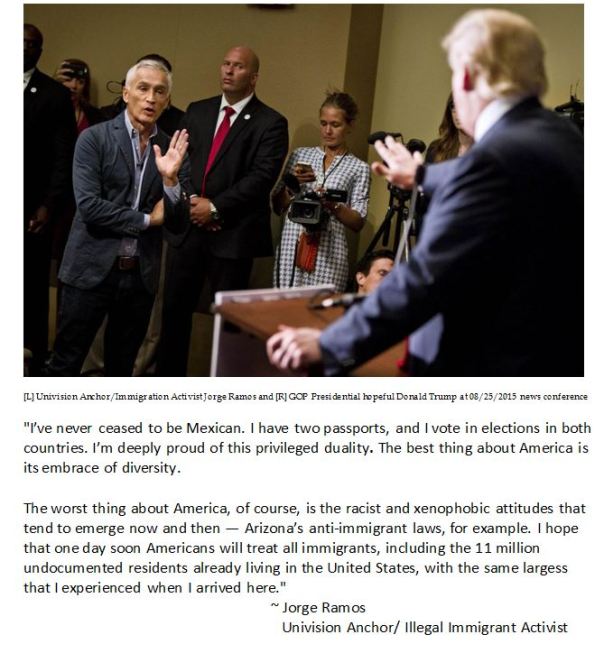Republican Presidential hopeful Donald Trump held a news conference before a rally in Dubuque, Iowa. Mr. Trump called on a reporter but Jorge Ramos jumped the journalistic queue and pressed his invariable query advocating immigration regularization for illegal aliens.
Trump rebuffed Ramos for overstepping his recognition. As Ramos lectured the candidate that he could not deport 11 million people and insisting that he had the right to talk, Mr. Trump signaled to security in order to have the unruly Univision anchor escorted from the room.
A little later during the presser, Ramos was allowed back into the press pool and got to ask his question, albeit in an argumentative and interrupting manner.
After the event, Jorge Ramos sought to rally the press against Donald Trump as an extremist . When interviewed by George Stephanopolis of ABC News (which Ramos is affiliated with via Fusion) Ramos claimed:
As a journalist you have to take a stand. I think the best journalism happens when you take a stand and when it comes to racism, discrimination, corruption, public life, dictatorship or human rights, as journalists, we are not only required but we are forced to take a stand and clearly when Mr. Trump is talking about immigration in an extreme way, we have to confront him and I think that’s what I did yesterday.
Be that as it may, Ramos clearly was not called upon in the initial exchange. But because Ramos things that he has the right to do so and it suits his purposes, he will break the rules. Not unlike what what illegal immigrants do.
Clearly, Jorge Ramos is passionate about advocating a comprehensive immigration reform which would result in regularization, which is anathematic to Mr. Trump meteoric campaign. But reporters ought to be reporting and not advocating, especially when questioning at press conferences.
Mr. Ramos seems to think that he has many special rights. Ramos reasserted his Mexican heritage and is a proud participant in American and Mexican elections. The American government does not take a stand on dual citizens voting in foreign elections. But that seems like a special right which emboldens Mr. Ramos and inspires him to yearn for other compadres to share in that privilege of blurred lines.
But is it right for a journalist to be biased against a subject who one is covering? It has long been shown that the media leans left. In the post Fairness Doctrine broadcasting, commentators have clearly partisan perspectives. As long as these biases are clearly disclosed, the audience can discern that the perspective can be jaundiced. But Mr. Ramos was a reporter who argued with his subject out of turn. Does Ramos believe that he has the special right to interrupt or advocate?
It should be noted that Jorge Ramos' daughter is working for Hillary Clinton's Presidential campaign. No wonder the GOP chose Telemundo instead of Univision to host a Florida Primary Presidential debate in February.
There is an idiomatic Castillian (peninsular Spanish) expression "¡Que cara dura!" which can be literally translated as "What a hard face!" but is captured in the Yiddish expression "What chutzpah!". Jumping the journalistic line and then justifying it as taking a stand against extremism epitomizes that idiom. Moreover, posing as a reporter and then acting akin to a "Black Lives Matter" agitator does not seem right. Furthermore, aggressively covering Republicans when his family is involved in the Hillary 2016 campaign is a misappropriated right.
From the District of Calamity-- ¡Que cara dura!





No comments:
Post a Comment